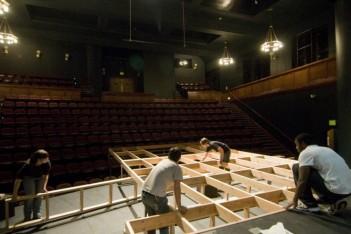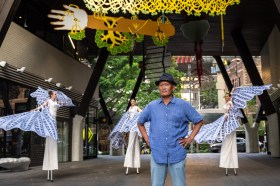Vocational training is just that, it teaches you the skills you need to commence your vocation.
University is a wonderful place to study a degree, but it takes three plus years to complete and many people have reasons not to want to wait that long before they start their industry careers.
When you are interested in the performing arts, the skills required are both generalised, such as dealing with people, understanding the industry and how to find work, and specialised, like how to rig a light, how to read music so you can call cues from it and so forth.
These skills will be taught as part of a three year degree course, but the expectation is that you will also have to write lengthy essays, study the art forms in detail and be able to articulate that knowledge at a superior level.
What if you want to learn practical skills on the job? You will need to find a traineeship or a very generous organisation or person to take you on without the OH&S knowledge or even any real skills to get you started.
By attending a TAFE course such as the Live Production Theatre and Events courses, you can have the skills in a year to get your foot in the door of the live production industries. It can give you the confidence to get out there after a year or two and look for work so that you can further build on your skill sets while working along side industry professionals in the work place.
TAFE courses are all about the doing. Competency based training is about being ticked off by a trainer after show that you have mastered a practical skill. It is all very well to be able to describe how to rig a lamp on paper, but it doesn’t demonstrate that you can climb the ladder with a lamp in your hand, hang it correctly on the LX bar, attach the safety chain and all in an OH&S compliant manner.
A decent TAFE course encourages their students to do work experience within the industry they hope to move into early in their courses. Sure, working on in-house projects are extremely valuable in building skills and developing confidence, but they don’t connect you with the diversity of the industry or the people within it.
A TAFE course will give you connections to industry, allowing you to gain industry experience and connections to industry people that you can use to seek volunteer and paid work or simply to have on your resume. For example Holmesglen Institute’s Certificate IV in Live Production has its students working as part of the Melbourne International Comedy Festival within two months of starting their course. MICF has employed over 40 graduates of that specific course since they began their relationship with the TAFE in 2001 as a result of seeing the students work.
In Holmesglen’s Certificate IV Live Production course, the students are a colourful bunch despite wearing the industry uniform of ‘blacks’. They come from private and public schools, some with an ATAR score guaranteed to get them a university offer and some with no ATAR score at all. There are older students, fed up with their current careers and wanting to pursue that theatre dream they’ve always regretted not following and always a few aspiring actors who just want to absorb every aspect of the theatre and make industry connections.
Yet they all have one thing in common and that is their passion for theatre; a passion shared with their teachers and satisfied through the continual practical experiences the course offers them.
TAFE Institutes require that sessional teaching staff work in industry so students are taught current industry standards. The small class sizes, practical experiences and industry opportunities make TAFE an attractive option for practical learners wanting to embark on a career in the near future.
Teaching in the intimate environment that TAFE offers is extremely rewarding. We prepare students for an immediate progression into the industry. The graduates of the course become our industry co-workers.
With the domination of social media it is easy to connect with graduates. On-line Alumni pages offer support and job opportunities. Graduates act as mentors to the current students while working on practical placements and course projects and the staff continue to make themselves available to graduates for guidance many years beyond completing the course.
It is not in a TAFE teacher’s job description to maintain a duty of care beyond the course’s duration but many do. I wonder if we would if those students were just another of the many faces in a large lecture theatre?
Where you decide to study depends entirely on your preferred learning style. TAFE provides an environment that is more hands on for both students and staff.
Places are still available to apply for Holmesglen Institute’s Certificate IV in Live Production.






